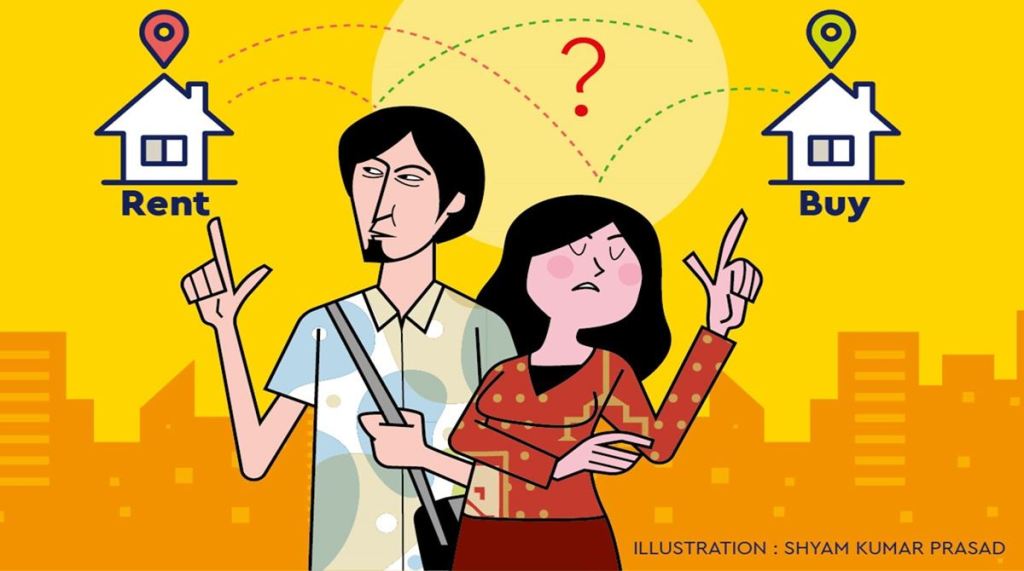In the realm of personal finance, few decisions loom as large and daunting as the choice between buying a home or a renting one. It’s a decision that can have a profound impact on your financial well-being, and there are compelling arguments on both sides of the divide. Both options have their advantages and disadvantages, and the decision to buy or rent should be based on individual financial situations and long-term goals.
The Case for Buying: Building Your Castle
There’s something undeniably romantic about the idea of homeownership. Owning a home means building equity. With every mortgage payment, you’re one step closer to fully owning your castle. It’s a feeling of stability and control that’s hard to replicate in the renting world.
As a homeowner, you’re the captain of your ship. You can paint the walls any color you desire, remodel the kitchen, and plant a garden in the backyard without asking for anyone’s permission. This sense of ownership goes beyond the financial aspect; it’s about making a space truly yours.
Also Read: How does a monthly reducing loan help a home loan borrower?
The potential for property appreciation is another feather in the homeowner’s cap. While it’s far from a guaranteed investment, history shows that, over time, real estate generally appreciates. This can translate into a significant financial advantage when you decide to sell your home.
Moreover, there are tax benefits to homeownership. Mortgage interest and property taxes are deductible, which can lead to substantial savings during tax season.
The Case Against Buying: The Heavy Burden of Ownership
However, let’s not romanticize homeownership without acknowledging the weight it can carry. Buying a home isn’t for everyone, and there are substantial cons to consider.
First and foremost is the monumental upfront cost. A down payment, closing costs, property taxes, and homeowner’s insurance can be a financial juggernaut that many can’t hurdle without substantial savings.
Once you’ve crossed that financial barrier, there’s the never-ending parade of maintenance and repair costs. Leaky roof? Broken furnace? Congratulations, it’s all on you. These unexpected expenses can put a significant dent in your budget and test your patience.
The lack of flexibility is another drawback of homeownership. If you need to move for work or personal reasons, selling your property isn’t as easy as packing your bags and handing over the keys. It can be a lengthy and costly process, especially if property values have taken a dip.
Lastly, let’s not forget that, especially in the early years, a substantial chunk of your mortgage payments goes toward interest, not the principal balance. It’s a sobering reminder that the path to full ownership is long and winding.
The Argument for Renting: Liberating Flexibility
Now, let’s pivot to the renter’s corner. Renting offers a different set of advantages that should not be overlooked.
For starters, renting typically requires a much smaller upfront financial commitment. A security deposit and first month’s rent are usually all that’s needed to secure your living space. This accessibility is a lifeline for those with limited savings.
Maintenance and repairs are the landlord’s headache, not yours. No need to stress over leaky faucets or malfunctioning appliances. Your responsibility is simply to notify the landlord, and they’ll handle the rest.
Renting also provides a level of flexibility that homeowners can only dream of. When your lease is up, you have the freedom to choose your next adventure without being tethered to a property. This is a blessing for individuals who anticipate frequent relocations or are uncertain about their long-term living situation.
And let’s not forget that renters are immune to the rollercoaster of property market volatility. If property values plummet, it’s the homeowner, not the renter, who bears the financial brunt.
The Renting Reality: No Equity, Rising Costs
However, it’s not all sunshine and rainbows in the renting world. The most significant downside is the lack of equity buildup. Your monthly rent payments go into your landlord’s pockets, not your own, and you won’t have a tangible asset to show for it down the road.
Furthermore, rent prices can rise over time, subjecting renters to potential financial strain. Unlike homeowners with fixed-rate mortgages, renters often face annual rent hikes that can erode their financial stability.
Lastly, renters do not enjoy the tax benefits that homeowners receive, such as mortgage interest deductions. It’s a fact of life that can make renting less financially advantageous in the long run.
So, what’s the ultimate verdict in the great housing debate? As someone who’s navigated this decision, I’ve come to realize that there is no one-size-fits-all answer. Your decision to buy or rent should be deeply personal and based on your unique financial situation and long-term goals. Consider your financial stability, long-term plans, budget, and lifestyle. Examine the local real estate market and weigh the pros and cons carefully.
Ultimately, your home should be a place where you feel comfortable, secure, and financially stable. Whether you choose to buy or rent, it’s the sense of belonging and contentment that truly matters. So, before you make your decision, take a moment to envision the life you want and choose the path that leads you there. In the end, that’s what homeownership is all about – creating your own piece of happiness, regardless of whether you own it or not.
(By Garvit Tiwari, Director & Co-Founder, InfraMantra. Views are personal)


